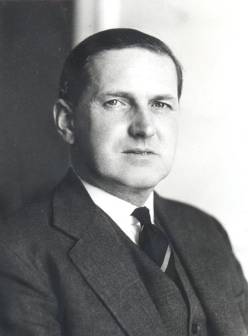Alister McIntosh
1906–1978

Born in Picton in 1906, Alister McIntosh trained as a librarian and an historian (he edited and largely wrote the provincial history of Marlborough). In 1926 he joined the Legislative Department as an assistant librarian in the General Assembly library. He took a year’s leave of absence in 1932 to study library development in the United States and Canada under a Carnegie Fellowship. On his return he wrote a farsighted report on library requirements in New Zealand, bringing forward many recommendations which were over time translated into policy.
McIntosh was seconded to the Prime Minister’s Department in 1935, and formally transferred a year later to become in effect deputy to the head, Carl Berendsen. After the outbreak of war he was appointed Assistant Secretary to the War Cabinet. Following Berendsen’s posting to Canberra in 1943, he succeeded him as Secretary to the War Cabinet. At the same time he was appointed Secretary of the newly-created Department of External Affairs. In 1945 he became, in addition, Permanent Head of the Prime Minister’s Department. He remained in charge of the joint Prime Minister’s and External Affairs Departments until he reached retirement age in 1965, when he was appointed as New Zealand’s first ambassador to Rome.
After the end of the war, Alister McIntosh set about building and staffing an effective diplomatic service. At a time when there were many other calls on scarce resources, this was not easy. He fought constant battles to increase the number of overseas posts, and to recruit and retain staff of the calibre he thought necessary to represent New Zealand overseas. With typical modesty he commented at the time of his retirement that “I should like to think that my own main usefulness has been the building up of the Department of which I have been the permanent head since its establishment in 1943”.
As well as building up the foreign service, McIntosh was instrumental in shaping New Zealand’s external policy in the post-war period. Although he was adamant that it was for the department to provide analysis, and judgements based on that analysis, and for the government to determine policy, he was not above nudging decisions in the direction he thought best served New Zealand interests. A realist and a pragmatist, he was renowned for “his caution, his political intuition, his instinct for what was practical, what would ‘run’”. According to one of his successors, George Laking, “he was quite prepared to wait as long as necessary, sometimes a matter of years, for his preferred solution to ripen and drop from the womb of time.”
Known with affection as “Mac”, McIntosh inspired great respect and loyalty from his staff. He was neither self-righteous nor judgemental, and he encouraged intellectual debate within the Department to the point that its atmosphere was likened to “that of a good university”.
After his retirement and the posting in Rome, Alister McIntosh was asked to take on a number of public responsibilities, including appointments to the Chair of the Trustees of the National Library of New Zealand, the New Zealand Historic Places Trust, and the Broadcasting Council of New Zealand. In 1973 he was appointed as a KCMG.
Sir Alister McIntosh died in Wellington on 30 November 1978.
Now read on
McGibbon, Ian (ed.) Undiplomatic Dialogue: Letters Between Carl Berendsen and Alister McIntosh 1943-1952, Auckland University Press, 1993.
Templeton, Malcolm (ed.) An Eye, an Ear and a Voice: 50 Years in New Zealand’s External Relations 1943-1993, Ministry of Foreign Affairs and Trade, 1993
McGibbon, Ian (ed.) Unofficial Channels: Letters between Alister McIntosh and Foss Shanahan, George Laking and Frank Corner 1946-1966, Victoria University Press, 1999.
Larkin, Tom (December 1993) A Special Time and Special People, New Zealand Books: A Quarterly Review December 1993. Retrieved from the New Zealand Books: A Quarterly Review website(external link)

